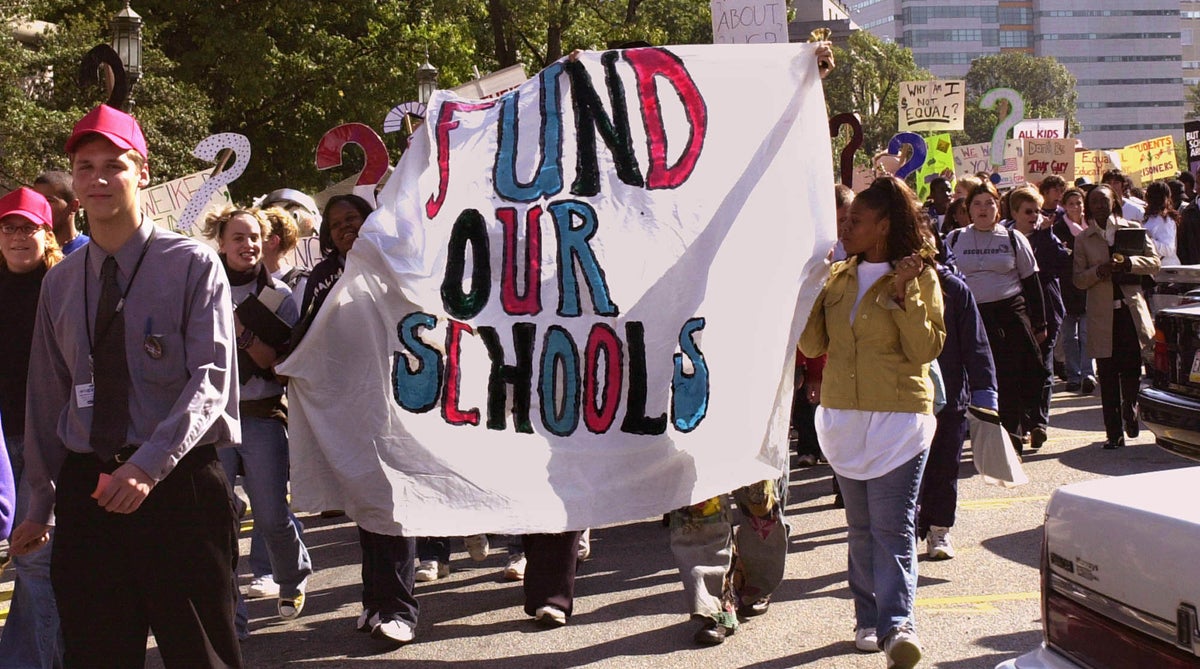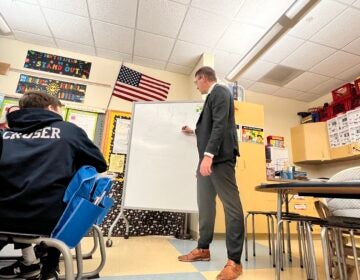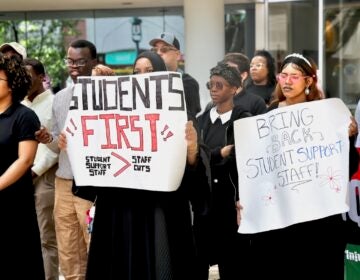Nutter’s team blasts mayoral candidates on education funding ideas, pushes property tax hike

(Paul Vathis/AP Photo, file)
Philadelphia Mayor Michael Nutter has made headlines recently for blasting the field of candidates running to take his job.
Specifically, he says that all of their plans to meet the school district’s funding needs are “bogus.”
On Monday, Nutter deployed two of his top officials to go through the mayoral candidates education funding ideas, and, plan by plan, explain why they’re not the best routes to delivering the recurring $103 million that Superintendent Hite has requested by September.
“It’s not that these are all horrible ideas and that no one should look at them, it’s just that they don’t get the district what it needs,” said city finance director Rob Dubow at a City Hall press conference.
The Nutter administration’s critique analyzed twelve of the proposals forwarded by candidates this campaign season. The full report can be viewed below.
Former city councilman Jim Kenney, state senator Anthony Hardy Williams and former common pleas court judge Nelson Diaz have offered the most comprehensive education funding plans. (See links).
Finding enough ‘fat’
Kenney’s plan hinges on generating $50 million in his first year in office by cutting the “fat” from city agencies and reforming how vendors bid for city contracts.
The former by implementing “zero-based budgeting”; the latter through “reverse auctioning.”
Dubow says those tactics might unearth some savings, but doubts that Kenney will get far – at-least in the short-term – before needing to cut services that citizens rely on.
“One of the big constraints is the amount of our budget that’s out of the mayor’s control, things like our pension costs, our debt-service costs,” said Dubow. “The biggest portions of what’s under the mayor’s control are police and fire, so I’m not sure how much this would generate.”
Kenney’s camp disagrees.
“The entire purpose of zero-based budgeting is for every department to have to justify its expenses – under that model firefighters and police tactics that save lives and keep Philadelphians safe would most certainly not be cut,” said Kenney spokesperson Lauren Hitt.
Reslicing the tax pie
State Senator Anthony Hardy Williams is suggesting giving the school district a greater share of the city’s property tax revenue.
Dubow says that would just short the city budget by $54 million.
“Which would create a hole in our five-year plan that we would have to figure out how to fix,” he said.
The Williams camp was not available to respond by deadline.
Nelson Diaz wants to boost education funding, in part, by putting a greater-tax burden on commercial property, but that would require the republican-held state legislature to pass a constitutional amendment.
“The way constitutional amendments work in Pennsylvania: You have to get approval in two straight sessions and then the voters. So it’s a multi-year process,” said Dubow. “The district wouldn’t be seeing any money for a while.”
The Diaz campaign says the Nutter administration is thinking too small.
“If the only real objection to some of our proposed solutions is that they’ll take a lot of work to pass, that’s not proof they’re impossible,” said Diaz spokesman Barry Caro. “If we want a world-class school system we’ll have to increase funding well beyond $105 million. That’s why our proposed long-term funding levels are 25% higher than current law.”
Nutter’s pitch
Dubow says Nutter’s plan to hike city property taxes by 9.4 percent is the only immediate, reliable option on the table. Average homeowners would see bills jump by $9 dollars per month.
“The reason that we ended up with the property tax increase is that after we looked at the other options, it was the only that fit the criteria that we needed: which was stable, recurring revenue for the school district that could start right away and wouldn’t damage city services.”
All of the candidates have opposed that plan on the campaign trail, saying property owners have been asked to dig deep enough in recent years. City Council president Darrell Clarke has given the proposed tax a chilly reception as well.
Dubow broke down exactly where the $105 million would come from if Nutter’s property tax passed.
The 200,000 Philly homeowners whose homes are worth less than $100,000 would pay 12 percent of the tax increase.
The 188,948 city homeowners whose homes are worth $100,000-$200,000 would shoulder 28 percent of the new burden.
The 52,209 homeowners with homes worth $200,000-$299,999 would pay 13 percent of the proposed levy.
The 8,611 homeowners – 4 percent of the city – whose property is worth more than $500,000 would bear 36 percent of the increase.
DV.load(“//www.documentcloud.org/documents/1873974-evaluating-school-funding-options-4-14-15.js”, {
width: 600,
height: 600,
sidebar: false,
text: false,
container: “#DV-viewer-1873974-evaluating-school-funding-options-4-14-15”
});
WHYY is your source for fact-based, in-depth journalism and information. As a nonprofit organization, we rely on financial support from readers like you. Please give today.





